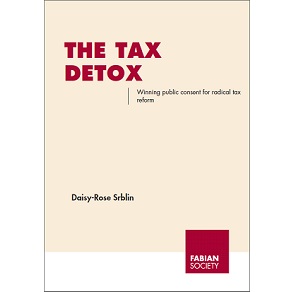The Tax Detox: Winning public consent for radical tax reform
Tax is not inherently unpopular, and it is possible to win public consent for reforms which are becoming imperative.

- The Tax Detox
- Daisy-Rose Srblin
- 4 December 2015
Now, more than ever, we have to talk honestly and comprehensively about tax. After centuries of tinkering around the edges, the UK’s tax system is inherently regressive and unfair. At the same time, trust in politics and government has reached a worrying low. We have a political status quo that has failed to be honest about the fact that high-quality, Scandinavian-style public provision cannot be funded by low, US-style taxation, with continuing deficit reduction just making this dilemma worse.
Public opinion has consistently been seen as an obstacle to tax reform, rather than an enabler. It is assumed that talking about tax is a political ‘third rail’, guaranteed to be electorally unpopular. However, this report presents findings from a series of Fabian focus groups across England, which demonstrate that the opposite is true. Tax is not inherently unpopular, and it is possible to win public consent for reforms which are becoming imperative. The Tax Detox presents a series of recommendations for how government can increase public satisfaction with the tax system and shows that it is possible to introduce reforms that are both progressive and popular.
The recommendations include:
- Inheritance tax is too toxic to save and should be scrapped entirely. In its place gifts, bequests and other transfers should instead be taxed as income, at the recipient’s marginal rate.
- Tax increases should be earmarked so the public know what services or entitlements new revenue will pay for. This approach has been seen in George Osborne’s recent budgets, including the new social care precept. But the report says that this earmarking should be independently scrutinised to maintain public trust.
- Tax statements should include a breakdown of what citizens’ money is spent on, designed independently of the Treasury to avoid such statements becoming political propaganda. These should clearly describe the total tax liabilities of high, middle and low income families to show how much even poor households pay.
- To deliver the more progressive tax system people want, a comprehensive strategy should be adopted for raising extra revenue from high wealth households, including reforms to the taxation of property, capital gains and pension saving. Meanwhile the burden on the poorest should be reduced, by reviewing indirect taxes.
- HMRC should have ministerial representation and be scrutinised by civic representatives to make it more accountable.
Author
Fabian membership
Join the Fabian Society today and help shape the future of the left
You’ll receive the quarterly Fabian Review and at least four reports or pamphlets each year sent to your door
Be a part of the debate at Fabian conferences and events and join one of our network of local Fabian societies
Join the Fabian SocietyBe the first to know
Sign up to the free Fabian Society newsletter
Find out about the latest Fabian Society research, publications and events with our regular updates
Sign up today